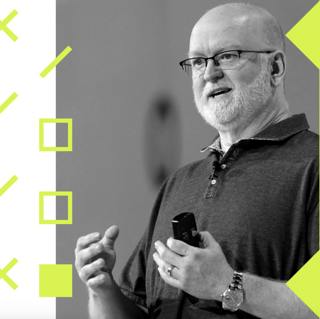
How the FBI built its own smartphone company to hack the criminal underworld
Today, I’m talking with Joseph Cox, one of the best cybersecurity reporters around and a co-founder of the new media site 404 Media. Joseph has a new book coming out in June called Dark Wire: The Incredible True Story of the Largest Sting Operation Ever, and I can’t recommend it enough. It’s basically a caper, but with the FBI running a phone network. For real. Joseph walks us through the fascinating world of underground criminal phone networks, and how secure messaging, a tech product beloved by drug traffickers, evolved from the days of BlackBerry Messenger to Signal. Along the way, the FBI got involved with its very own startup, ANOM, as part of one of the most effective trojan horse operations in the history of cybersecurity. Joseph’s book is a great read, but it also touches on a lot of things we talk about a lot here on Decoder. So this conversation was a fun one. Links: Dark Wire by Joseph Cox | Hachette Book Group How Vice became ‘a fucking clown show’ | The Verge Cyber Official Speaks Out, Reveals Mobile Network Attacks in US | 404 Media Revealed: The Country that Secretly Wiretapped the World for the FBI | 404 Media How Secure Phones for Criminals Are Sold on Instagram | Motherboard A Peek Inside the Phone Company Secretly Used in an FBI Honeypot | Motherboard The FBI secretly launched an encrypted messaging system for criminals | The Verge Canadian police have had master key to BlackBerry's encryption since 2010 | The Verge Credits: Decoder is a production of The Verge, and part of the Vox Media Podcast Network. Today’s episode was produced by Kate Cox and Nick Statt and was edited by Callie Wright. The Decoder music is by Breakmaster Cylinder. Learn more about your ad choices. Visit podcastchoices.com/adchoices
23 Touko 202442min

Google's Sundar Pichai on AI-powered search and the future of the web
Today, I’m talking to Google CEO Sundar Pichai, who joined the show the day after the big Google I/O developer conference. Google’s focus during the conference was on how it’s building AI into virtually all of its products. If you’re a Decoder listener, you’ve heard me talk about this idea a lot over the past year: I call it “Google Zero,” and I’ve been asking a lot of web and media CEOs what would happen to their businesses if their Google traffic were to go to zero. In a world where AI powers search with overviews and summaries, that’s a real possibility. What then happens to the web? I’ve talked to Sundar quite a bit over the past few years, and this was the most fired up I’ve ever seen him. I think you can really tell that there is a deep tension between the vision Google has for the future — where AI magically makes us smarter, more productive, more artistic — and the very real fears and anxieties creators and website owners are feeling right now about how search has changed and how AI might swallow the internet forever, and that he’s wrestling with that tension. Links: Google and OpenAI are racing to rewire the internet — Command Line Google I/O 2024: everything announced — The Verge Google is redesigning its search engine, and it’s AI all the way down — The Verge Project Astra is the future of AI at Google — The Verge Did SEO experts ruin the internet or did Google? — The Verge YouTube is going to start cracking down on AI clones of musicians — The Verge AI is killing the old web, and the new web struggles to be born — The Verge How Google is killing independent sites like ours — HouseFresh Inside the First 'SEO Heist' of the AI Era — Business Insider Google’s Sundar Pichai talks Search, AI, and dancing with Microsoft — Decoder Transcript: https://www.theverge.com/e/23922415 Credits: Decoder is a production of The Verge, and part of the Vox Media Podcast Network. Today’s episode was produced by Kate Cox and Nick Statt and was edited by Callie Wright. The Decoder music is by Breakmaster Cylinder. Learn more about your ad choices. Visit podcastchoices.com/adchoices
20 Touko 202444min

TikTok's big bet to fight the ban bill
Last week, TikTok filed a lawsuit against the US government claiming the divest-or-ban law is unconstitutional — a case it needs to win in order to keep operating under Bytedance’s ownership. There’s a lot of back and forth between the facts and the law here: Some of the legal claims are complex and sit in tension with a long history of prior attempts to regulate speech and the internet, while the simple facts of what TikTok has already promised to do around the world contradict some its arguments. Verge editors Sarah Jeong and Alex Heath join me to explain what it all means. Links: TikTok and Bytedance v Merrick Garland (PDF) TikTok sues the US government over ban | The Verge Senate passes TikTok ban bill, sending it to President Biden’s desk | The Verge The legal challenges that lie ahead for TikTok — in both the US and China | The Verge Why the TikTok ban won’t solve the US’s online privacy problems. | Decoder Biden signs TikTok ‘ban’ bill into law, starting the clock for ByteDance to divest it | The Verge Credits: Decoder is a production of The Verge, and part of the Vox Media Podcast Network. Today’s episode was produced by Kate Cox and Nick Statt and was edited by Callie Wright. The Decoder music is by Breakmaster Cylinder. Learn more about your ad choices. Visit podcastchoices.com/adchoices
16 Touko 202446min

Why Adobe CEO Shantanu Narayen is confident we'll all adapt to AI
Adobe CEO Shantanu Narayen has been at the top of my list of people I’ve wanted to talk to for the show since we first launched — he’s led Adobe for nearly 17 years now, but he doesn’t do too many wide-ranging interviews. I’ve always thought Adobe was an underappreciated company — its tools sit at the center of nearly every major creative workflow you can think of — and with generative AI poised to change the very nature of creative software, it seemed particularly important to talk with Shantanu now. Adobe sits right at the center of the whole web of tensions, especially as the company has evolved its business and business model over time. And now, AI really changes what it means to make and distribute creative work. Not many people are seeing revenue returns on it just yet and there are the fundamental philosophical challenges of adding AI to photo and video tools. What does it mean when a company like Adobe, which makes the tools so many people use to make their art, sees the creative process as a step in a marketing chain, instead of a goal in and of itself? Links: How Adobe is managing the AI copyright dilemma, with general counsel Dana Rao Adobe Launches Creative Cloud (2012) What was Photoshop like in 1994? Photoshop’s Generative Fill tool turns vacation photos into nightmares - The Verge New York Daily News, Chicago Tribune, and others sue OpenAI and Microsoft - The Verge The FAIR Act: A New Right to Protect Artists in the Age of AI | Adobe Blog Adobe’s Firefly generative AI tools are now generally available - The Verge This Wacom AI debacle has certainly taken a turn. - The Verge Transcript: https://www.theverge.com/e/23917997 Credits: Decoder is a production of The Verge, and part of the Vox Media Podcast Network. Today’s episode was produced by Kate Cox and Nick Statt and was edited by Callie Wright. The Decoder music is by Breakmaster Cylinder. Learn more about your ad choices. Visit podcastchoices.com/adchoices
13 Touko 20241h

Why the tech industry can’t crack the smart home
Today, we’re going to talk about the smart home — one of the oldest, most important, and most challenging dreams in the history of the tech industry. The idea of your house responding to you and your family, and generally being as automated and as smart as your phone or your laptop, has inspired generations of technologists. But after decades of promises, it’s all still pretty messy. Because the big problem with the smart home has been blindingly obvious for a very long time: interoperability. Yet there are some promising developments out there that might make it a little better. To help sort it all out, I invited Verge smart home reviewer Jen Tuohy, who is one of the most influential reporters on the smart home beat today. Jen and I break down how Matter, the open source standard, is trying to fix these issues, but there is still a lot of work to do. Links: Matter is now racing ahead, but the platforms are holding it back — The Verge 2023 in the smart home: Matter’s broken promises — The Verge Smart home hubs: what they are and why you need one — The Verge My smart kitchen: the good, the bad, and the future — The Verge How bad business broke the smart home — The Verge The smart home is finally getting out of your phone and into your home — The Verge Credits: Decoder is a production of The Verge, and part of the Vox Media Podcast Network. Today’s episode was produced by Kate Cox and Nick Statt and was edited by Callie Wright. Our supervising producer is Liam James. The Decoder music is by Breakmaster Cylinder. Learn more about your ad choices. Visit podcastchoices.com/adchoices
9 Touko 202440min

Polestar CEO Thomas Ingenlath on life after Volvo and weathering the EV slowdown
Today, I’m talking with Polestar CEO Thomas Ingenlath, whom I first interviewed on the show back in 2021. Those were heady days — especially for upstart EV companies like Polestar, which all seemed poised to capture what felt like infinite demand for electric cars. Now, in 2024, the market looks a lot different, and so does Polestar, which is no longer majority-owned by Volvo. Instead, Volvo is now a more independent sister company, and both Volvo and Polestar fall under Chinese parent company Geely. You know I love a structure shuffle, so Thomas and I really got into it: what does it mean for Volvo to have stepped back, and how much can Polestar take from Geely’s various platforms while still remaining distinct from the other brands in the portfolio? We also talked about the upcoming Polestar 3 SUV and Polestar 4 crossover, and I asked Thomas what he thinks of the Cybertruck. Links: Can Polestar design a new kind of car company? — Decoder The Polestar 3 isn’t out yet, and it’s already getting a big price cut — The Verge The Polestar 4 gets an official price ahead of its debut — The Verge Polestar makes the rear window obsolete with its new crossover coupe — The Verge Volvo and Polestar drift a little farther apart — The Verge Polestar gets a nearly $1 billion lifeline — The Verge Car-tech breakup fever is heating up — The Verge Polestar is working on its own smartphone to sync with its EVs — The Verge Polestar’s electric future looks high-performing, and promising — The Verge Electric car maker Polestar to cut around 450 jobs globally — Reuters Transcript: https://www.theverge.com/e/23912151 Credits: Decoder is a production of The Verge, and part of the Vox Media Podcast Network. Today’s episode was produced by Nick Statt and was edited by Callie Wright. Our supervising producer is Liam James. The Decoder music is by Breakmaster Cylinder. Learn more about your ad choices. Visit podcastchoices.com/adchoices
6 Touko 20241h 4min

Understanding the chaos at Tesla
Today, Verge transportation editor Andy Hawkins and I are going to try and figure out Tesla. I said try — I did not say succeed. But we’re going to try. That’s because Tesla has been on a real rollercoaster these past two weeks, in terms of its stock price, its basic financials, and well, its vibes. If you’ve been following the company, you know that that gap between what the business is and how its valued has been getting bigger and bigger for years now – and lately, with Elon Musk saying he’s going all-in on autonomy and announcing a robotaxi event in August, it seems like we’re getting closer to a make or break moment, especially as competition in the broader EV market heats up. Links: Tesla reaches deals in China on self-driving cars — NYT Elon Musk goes ‘absolutely hard core’ in another round of Tesla layoffs — The Verge Tesla’s Autopilot and Full Self-Driving linked to dozens of deaths — The Verge Elon Musk says Tesla will reveal its robotaxi on August 8th — The Verge A cheaper Tesla is back on the menu — The Verge Tesla’s profits sink as the company struggles with cooling demand — The Verge Tesla lays off ‘more than 10 percent’ of its workforce, loses top executives — The Verge Tesla recalls all 3,878 Cybertrucks over faulty accelerator pedal — The Verge Elon Musk says it’s “time to reorganize” Tesla — The Verge Elon Musk lost Democrats on Tesla when he needed them most — WSJ Credits: Decoder is a production of The Verge, and part of the Vox Media Podcast Network. Today’s episode was produced by Kate Cox and Nick Statt and was edited by Callie Wright. Our supervising producer is Liam James. The Decoder music is by Breakmaster Cylinder. Learn more about your ad choices. Visit podcastchoices.com/adchoices
2 Touko 202439min

Mercedes-Benz CEO Ola Källenius explains why EVs are still the future — but Apple's next-gen CarPlay isn't
A lot has changed since the last time Ola was on Decoder. Back then, he said Mercedes would have an all-EV lineup by 2030 — a promise a whole lot of car companies, including Mercedes, have now had to soften or walk back. But he doesn't see that as a setback at all, and he and Mercedes are both still committed to phasing out gas in the long run. We also spent some time talking about what's happening both on the outside of cars — Mercedes' classic look and its EV look aren't necessarily quite in the same place — and on the inside of them, as infotainment becomes a huge point of competition and design. Links: How Mercedes-Benz CEO Ola Källenius is refocusing for an electric future - The Verge Mercedes-Benz opens its first 400kW EV charging station in the US - The Verge Mercedes-Benz is the first German automaker to adopt Tesla’s EV charging connector - The Verge Is the metaverse going to suck? A conversation with Matthew Ball - The Verge The Mercedes G-Wagen, the ultimate off-road status symbol, goes electric - The Verge Mercedes workers file federal charges with NLRB to stop union busting - The Alabama Political Reporter The MBUX Hyperscreen - Mercedes-Benz USA Transcript: https://www.theverge.com/e/23904592 Credits: Decoder is a production of The Verge, and part of the Vox Media Podcast Network. Today’s episode was produced by Kate Cox and Nick Statt and was edited by Callie Wright. The Decoder music is by Breakmaster Cylinder. Learn more about your ad choices. Visit podcastchoices.com/adchoices
29 Huhti 20241h 8min






















